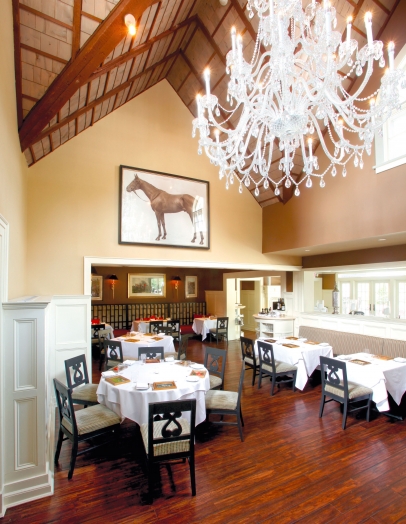Ryland Inn's Rebirth Enjoys Critical Acclaim and Success
Return to Ryland
Can a legendary restaurant be reborn? This is the question facing the Ryland Inn, made famous by Craig Shelton – perhaps the most celebrated New Jersey chef of all time.
"This is a property that eclipses all others in our great state," says Anthony Bucco, the new executive chef here, charged with the task of working in Shelton's long shadow. Indeed, the chefs at the helms of many of New Jersey's top restaurants first came through this kitchen, among them Scott Anderson of elements, Humberto Campos of Lorena's, and James Laird of Restaurant Serenade.
Closed in 2007, the Ryland Inn reopened its doors in October 2012 under new management. Since then, it has enjoyed critical acclaim and popular success, both for its food and for the sensitive transformation of its landmark space among the rolling hills of Whitehouse Station.
Bucco, 37, describes his culinary style as "subtle refinement, from the heart." Compared to Shelton's, he says, "it's more familiar, less challenging – refined but not pretentious." He likens the Ryland's contemporary American cuisine to the offspring of a marriage between Restaurant Nicholas ("which can play it safe") and elements ("which is avant-garde"). "The Cretellas [the Ryland Inn's new owners] have allowed me a lot of personal expression," he says.
That's because Jeanne and Frank Cretella, who have tracked Bucco's career for many years, had him in mind for the job from the beginning. "We knew the day we bought the Ryland," Jeanne Cretella says of their first hire. "After calling our parents, our next call was to Anthony. He brings everything to the table. It's his passion for cooking combined with how he interacts with guests and with staff, both the front and back of the house. He's intense, he's done wonderful things, and he wants to grow the business."
Bucco says his work at the Ryland "parallels my personal skill set." A graduate of the New York Restaurant School, his first break came in 2003 at Stage Left in New Brunswick, where he was executive chef for five years. "That," he tells me, "is where I learned how to work with the strengths and weaknesses of your team. There, I went from boy to man." He left Stage Left to take on the role of opening chef at Uproot in Warren, where he created an ambitious, innovative menu that he characterizes as "East Village in Central Jersey." At Uproot, Bucco says, he then went "from man to artist." But while offerings such as elk tartare crostini and black cod in grapefruit broth went over well with critics and foodies, the local clientele wanted something less challenging.
About a stint at Restaurant Latour in Hamburg, Bucco says, "I discovered that you could have a $7 million wine cellar, but hospitality and location also play roles in filling your dining room." At the Ryland, he points out, "We're located off the beaten path, so we could easily get pigeonholed as a special-occasion place. But we want to be a Tuesday-night place as well. We aim to give a product that people enjoy and come back to again and again."
Which is why, in addition to entrées like organic Irish salmon with black truffle, the menu offers one bistro-style dish each night, including Tuesday's seared hanger steak and Friday's rainbow trout amandine. "At the Ryland," Bucco continues, "I've gone from artist to the chef role. I've been given the opportunity to take a rich property with a history of culinary excellence, and here is where I want to leave my personal legacy."
Bucco's cuisine, while recognizable, is also up-to-the-minute and sophisticated, employing the techniques of modernist cuisine in subtle but exciting ways. For me, one dish in particular perfectly exemplifies his culinary evolution. At Stage Left's sister restaurant, Catherine Lombardi, one of his signature desserts was chocolatehazelnut- espresso bread pudding served with crème anglaise – a dish I thought so perfect, I asked for the recipe and have been reproducing it for years. Well, chocolate-espresso bread pudding has also shown up on the Ryland menu. Only now, it incorporates cocoa nibs and caramel made with stout, and comes topped with candied celery and celery root ice cream.
Of course, the kitchen was only part of the magic that was the storied Ryland Inn – the space had been just as revered as the food. Set amid ten pastoral acres in Hunterdon County, it played up its horse-country roots in a landmark building that exuded grace and luxurious country charm. "This building has seen two centuries of hospitality," Bucco says. "It dates to 1794 and started out as a stagecoach stop." That legacy was interrupted in 2007, after the combination of a burst water pipe, a slowing economy, and other factors led to the closure and subsequent foreclosure of the inn. The space sat idle, untended, for four years until the Cretellas bought it.
At the time he received the Cretallas' phone call, Bucco was cheffing at the private Hamilton Farm Golf Club. "I welcomed Frank's call and the opportunity with open arms," Bucco recalls, "and signed on over the phone! Then the visits to the site started. I saw a cold, dirty, moldy wreck. But Frank had the ability to see the potential; he had a vision. The project was challenging and exciting for all of us. I think we have been very sensitive to what the space had been."
The working theme of the Cretellas' renovation is "reminiscent of the past yet acknowledging the future." From the outside, the inn remains as recognizable as ever. A long white portico has been gracefully tacked on to its gleaming white facade, with patios added at the rear. Key changes to the interior include raising the formerly low ceilings to vaulted heights in the bar and dining rooms, and to cathedral height in the chef 's dining room. There's a shiny new kitchen. The beautiful Ryland bar was extended and restored to its former gleaming glory. Place settings that incorporate sepia photos of the old inn and equestrian-themed artwork on the walls pay homage to the Ryland's past, as do luxuriant touches like extra-plush white table linens and silver coffee services. Together, they conjure for me the essence of what it felt like to dine there in the glory days.
Another legacy of the original Ryland was its vegetable garden – a novelty on the 1990s Jersey restaurant scene. That organic garden is well on its way to being fully restored. Last spring, it began supplying the kitchen with peas, nasturtiums, and herbs such as red-veined sorrel and bronze fennel. Cherries, peaches and pears from trees in its small orchard followed soon thereafter. Plans are underway for a hydroponic operation that the Cretellas term a "farm," which will supply the kitchen with lettuces and fresh herbs year-round.
The biggest physical changes center on what is being called the "hospitality campus." Hospitality is a key word for the Cretellas, whose other holdings include Liberty House in Jersey City and Stone House at Stirling Ridge in Warren, both of which combine à la carte restaurants with upscale event venues. That is their plan for the Ryland as well. September will see the first weddings and other celebrations held in a new, 6,000-square-foot reception space that's attached to but sealed off from the restaurant. "With dancing, it will accommodate around 250 people," Jeanne Cretella reports. Bucco will also be overseeing all catering and banquet-food operations. "We have a pretty aggressive calendar already in place for September," he says, "but the business is ready for this first expansion."
The final phase of the hospitality campus will incorporate a new banquet facility on the grounds where a tented pavilion had reigned under Craig Shelton's stewardship. "This is the larger of the two event spaces," Jeanne Cretella says. "It will not be attached to the Ryland and will have its own separate valet drop-off. Both spaces are very private from each other." The last components of the plan are to erect a small hotel of about 40 rooms and to renovate the property's barn, transforming it into a state-of-the-art conference center.
So the Ryland Inn, once a resting place for weary stagecoach travelers during America's early years, and then New Jersey's most regarded restaurant, appears ready to reinvent itself at least one more time.
"We're starting to hit our stride," Bucco says. "Someone in the business told me it takes five years to build a brand. Our brand is, in some ways, 200 years old. But at the same time, we're building a new business with a new identity."






